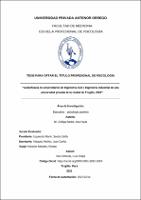Autoeficacia en universitarios de ingeniería civil e ingeniería industrial de una universidad privada de la ciudad de Trujillo, 2020

Ver/
Descargar
(application/pdf: 67.27Kb)
(application/pdf: 67.27Kb)
Fecha
2022Autor(es)
Zuñiga Bartra, Ana Paula
Metadatos
Mostrar el registro completo del ítemResumen
El presente estudio tuvo como objetivo establecer si existen diferencias significativas en
los niveles de autoeficacia entre los estudiantes de ingeniería civil y los estudiantes de
ingeniería industrial de una universidad privada de la ciudad de Trujillo, 2020. Para medir
los niveles de autoeficacia de los universitarios se utilizó el instrumento denominado
escala de autoeficacia percibida específica de situaciones académicas, el tamaño de la
muestra fue de 242 y estuvo conformada por estudiantes del IX y X ciclo de ingeniería
industrial (124) e ingeniería civil (118). Luego, para hallar las diferencias significativas
entre los niveles de autoeficacia de los estudiantes, considerando que el tamaño de la
muestra fue mayor a 25, se utilizó el estadístico Z. En esta investigación se concluyó que
no existen diferencias significativas en los niveles de autoeficacia entre los estudiantes de
ingeniería civil y los estudiantes de ingeniería industrial, deduciendo que la carrera
profesional no sería una variable influyente, sin embargo, se halló que sí existen
diferencias significativas en los niveles de autoeficacia entre los hombres de ingeniería
civil y las mujeres de ingeniería civil, además, se halló que sí existen diferencias
significativas en los niveles de autoeficacia entre los hombres de ingeniería industrial y
las mujeres de ingeniería industrial, lo que demuestra que la variable género es relevante
en la percepción de la autoeficacia entre los estudiantes universitarios. The objective of this study was to establish whether there are significant differences in
the levels of self-efficacy between civil engineering students and industrial engineering
students from a private university in the city of Trujillo, 2020. To measure the selfefficacy levels of university students, used the instrument called the scale of perceived
self-efficacy specific to academic situations, the sample size was 242 and it was made up
of students from the IX and X cycles of industrial engineering (124) and civil engineering
(118). Then, to find the significant differences between the students' self-efficacy levels,
considering that the sample size was greater than 25, the Z statistic was used. In this
research it was concluded that there are no significant differences in the self-efficacy
levels between civil engineering students and industrial engineering students, deducing
that the professional career would not be an influential variable, however, it was found
that there are significant differences in the levels of self-efficacy between civil
engineering men and civil engineering women, and it was found that there are significant
differences in the levels of self-efficacy between men in industrial engineering and
women in industrial engineering, which shows that the gender variable is relevant in the
perception of self-efficacy among university students.
Colecciones
- Psicología [613]

